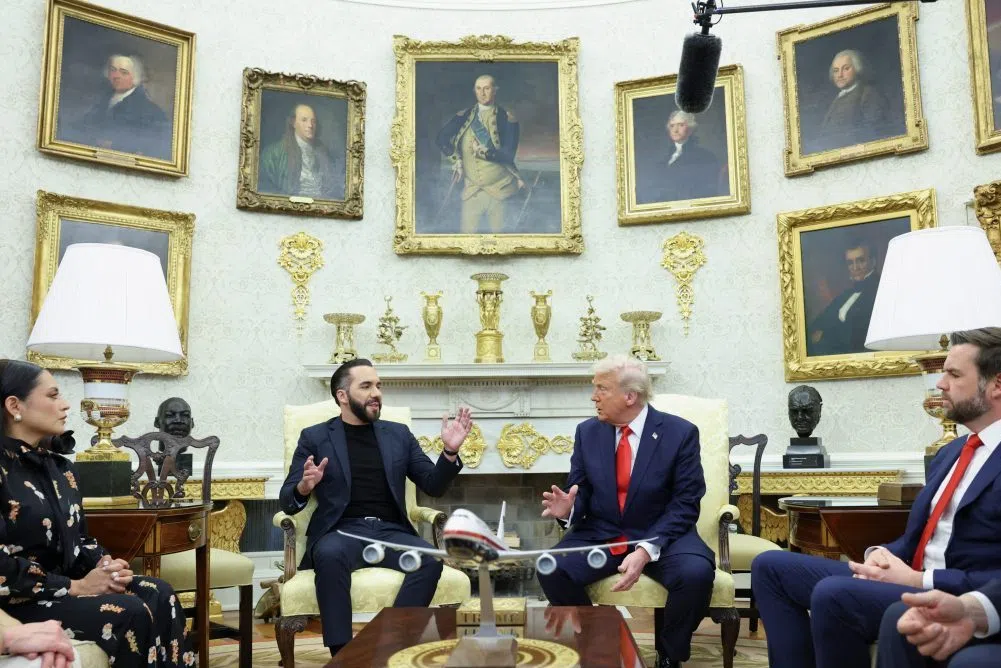Updated: 11:38 a.m.
WASHINGTON (Reuters) – President Donald Trump met on Monday with El Salvador President Nayib Bukele, a leader praised by the administration for opening his country’s prison system to alleged gang members and detainees Trump wants out of the United States.
The Trump administration has deported hundreds of people, mostly Venezuelans, to El Salvador under the 1798 Alien Enemies Act, including a Maryland resident it has acknowledged deporting by mistake.
Trump, who came into office in January promising to reform U.S. immigration policy, has found a kindred spirit for that effort in Bukele. The migrants El Salvador accepts from the U.S. are housed in a high-security prison critics say engages in human rights abuses.
Trump met Bukele at the White House to discuss further cooperation on security and migration, El Salvador’s embrace of Bitcoin, and tariffs.
“I think he’s doing a fantastic job, and he’s taking care of a lot of problems that we have that we really wouldn’t be able to take care of from a cost standpoint,” Trump told reporters on Sunday about Bukele, referring to the cost of imprisoning the detainees in El Salvador.
“He’s been amazing. We have some very bad people in that prison. People that should have never have been allowed into our country. People that murdered, drug dealers, some of the worst people on earth are in that prison. And he’s able to do that.”
Rights groups say Bukele has jailed thousands of people without due process in a sweeping crackdown on gangs, claims Bukele rejects. Pressed on whether he had concerns about alleged human rights abuses at the mega-prison, Trump said no.
“I don’t see it. I don’t see that,” he said.
The State Department last week lifted its advisory for American travelers to El Salvador to level one, the safest level, crediting Bukele for reducing gang activity and violent crime.
The U.S. on Saturday deported 10 more people it alleges are gang members to El Salvador, said Secretary of State Marco Rubio, who called the alliance between Trump and Bukele “an example for security and prosperity in our hemisphere.”
Lawyers and relatives of the migrants held in El Salvador say they are not gang members and had no opportunity to contest the U.S. government assertion that they were. The Trump administration says it vetted migrants to ensure they belonged to gangs including Tren de Aragua and MS-13, which it labels terrorist organizations.
Last month, after a judge said flights carrying migrants processed under the Alien Enemies Act should return to the U.S., Bukele wrote “Oopsie… Too late” on social media alongside footage showing men being hustled off a plane in the dark of night.
‘BRING KILMAR HOME’
The case of Kilmar Abrego Garcia, a Salvadoran living in Maryland who was sent to El Salvador’s so-called Terrorism Confinement Center on March 15 despite an order protecting him from deportation, has drawn particular attention.
The U.S. Supreme Court upheld an order from Judge Paula Xinis directing the administration to “facilitate and effectuate” his return but said the term “effectuate” was unclear and might exceed her authority.
Trump told reporters on Friday that his administration would bring the man back if the high court directed it to.
However, in a court filing on Sunday, the administration said it was not obligated to help Abrego Garcia get out of prison in El Salvador.
White House deputy chief of staff Stephen Miller on Monday insisted that Abrego Garcia could be deported, despite the court order.
“His status was he’s an illegal alien who’s been ordered deported, which means he can be indefinitely detained and removed to any other country in the world,” Miller said.
An immigration judge had previously granted Abrego Garcia protected status, finding that he could face gang violence if deported to El Salvador, and he held a permit to work in the United States.
Demonstrators, including Abrego Garcia’s wife and young children, gathered outside the White House ahead of Trump’s meeting with Bukele.
“President Trump, bring Kilmar home now!” a speaker addressing the group outside the White House said.
(Reporting by Jeff Mason; additional reporting by Simon Lewis, Julio-Cesar Chavez, Doina Chiacu and Katharine Jackson; Editing by Colleen Jenkins, Kate Mayberry and Deepa Babington)
WASHINGTON (Reuters) – President Donald Trump meets on Monday with El Salvador President Nayib Bukele, a leader praised by the administration for opening his country’s prison system to alleged gang members and detainees Trump wants out of the United States.
The Trump administration has deported hundreds of Venezuelans to El Salvador under the 1798 Alien Enemies Act, including a Maryland resident it has acknowledged deporting by mistake.
Trump, who came into office in January promising to reform U.S. immigration policy, has found a kindred spirit for that effort in Bukele. The migrants El Salvador accepts from the U.S. are housed in a high-security prison critics say engages in human rights abuses.
Trump will meet Bukele at 11 a.m. (1500 GMT) at the White House.
“I think he’s doing a fantastic job, and he’s taking care of a lot of problems that we have that we really wouldn’t be able to take care of from a cost standpoint,” Trump told reporters on Sunday about Bukele, referring to the cost of imprisoning the detainees in El Salvador.
“He’s been amazing. We have some very bad people in that prison. People that should have never have been allowed into our country. People that murdered, drug dealers, some of the worst people on earth are in that prison. And he’s able to do that.”
Pressed on whether he had concerns about alleged human rights abuses at the mega-prison, Trump said no.
“I don’t see it. I don’t see that,” he said.
The U.S. on Saturday deported 10 more people it alleges are gang members to El Salvador, said Secretary of State Marco Rubio, who called the alliance between Trump and Bukele “an example for security and prosperity in our hemisphere.”
Lawyers and relatives of the migrants held in El Salvador say they are not gang members and had no opportunity to contest the U.S. government assertion that they were. The Trump administration says it vetted migrants to ensure they belonged to Tren de Aragua, which it labels a terrorist organization.
Last month, after a judge said flights carrying migrants processed under the Alien Enemies Act should return to the U.S., Bukele wrote “Oopsie… Too late” on social media alongside footage showing men being hustled off a plane in the dark of night.
The case of Kilmar Abrego Garcia, a Maryland resident who was sent to El Salvador’s so-called Terrorism Confinement Center on March 15 despite an order protecting him from deportation, has drawn particular attention.
The U.S. Supreme Court upheld an order from Judge Paula Xinis directing the administration to “facilitate and effectuate” his return but said the term “effectuate” was unclear and might exceed her authority.
Trump told reporters on Friday that his administration would bring the man back if the high court directed it to.
However, in a court filing on Sunday, the administration said it was not obligated to help Abrego Garcia get out of prison in El Salvador.
(Reporting by Jeff Mason; Editing by Colleen Jenkins and Kate Mayberry)




Comments